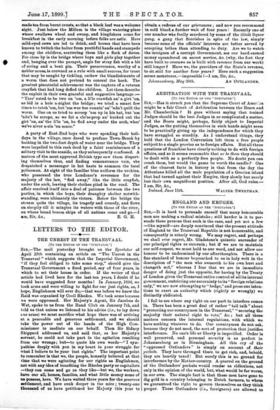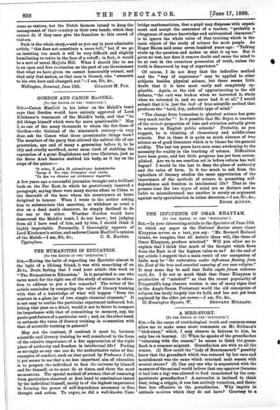ENGLAND AND KRUGER.
[TO THE EDITOR OF THE "SPECTATOR."] SIR, It is hard to persuade oneself that many honourable men are making a radical mistake ; still harder is it to per. suede these persons that such is the case, and yet not a few —like myself—are deeply convinced that the present attitude of England to the Transvaal Republic is not honourable, and consequently is utterly wrong. We may regret, and perhaps we shall ever regret, Mr. Gladstone's quixotic surrender of our principal rights as suzerain ; but if we are to maintain our self-respect, we must hold to our word, and not allow our honour to be undermined by our afterthoughts. There is a fine standard of honour bequeathed to us in holy writ in the description of " the man who sweareth to his own hurt and changeth not," whereas I fear that we are in immediate danger of doing just the opposite, for having by the Treaty of London given the Transvaal entire control of all its internal government, restricting our suzerainty to its " foreign relations only," we are now attempting to " hedge," and press our inten- tions to exert an authority which (rightly or wrongly) we distinctly abdicated.
I fail to see where any right on our part to interfere comes in. There has been a great deal of rather " tall talk " about " protecting our countrymen in the Transvaal," " securing the majority their natural right to vote," &c.; but all these matters concern the internal regulations, with which we have nothing whatever to do. Our countrymen do not ask, because they do not need, the sort of protection that justifies interference. No one's life or liberty is imperilled. Order is well preserved, and personal security is as perfect in Johannesburg as in Birmingham. All this cry of the "oppressed Outlanders" is simply on account of their pockets. They have thronged there to get rich, and, behold, they are heavily taxed! But surely this is no ground for interference by the Mother-country. A quarrel on the ground of the Outlanders' pockets would render us ridiculous, not only in the opinion of the world, but, what would be far worse, in our own. The simple fact is that these men have gone to dig gold in a country belonging to Dutch farmers, to whom we guaranteed the right to govern themselves as they think proper. These Outlanders (i.e., foreigners) are allowed to
come as visitors, but the Dutch farmers intend to keep the management of their country in their own hands, which they cannot do if they once give the franchise to this crowd of visitors.
Such is the whole story,—and as you say in your admirable article, "this does not constitute a casus belli," but if we go on insisting too much it will be very difficult and slightly humiliating to retire in the face of a rebuff ; in fact, it would be a sort of moral Majuba Hill. What I should like to see is an open and free realisation on the part of our Government that what we have given we cannot honourably retract, and that only that nation, as that man is blessed, who " sweareth to his own hurt and changeth not."—I am, Sir, 8,:c , Wellington, Somerset, June lath. CHARLES H. Fox.







































 Previous page
Previous page